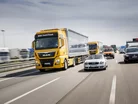Traton champions decarbonisation of the trucking industry

The trucking industry makes up a critical portion of the supply chain, accounting for a significant percentage of emissions as well. According to the US Environmental Protection Agency (EPA), transportation alone is responsible for 27% of its greenhouse gas (GHG) emissions.
On a more granular level, medium to heavy-duty trucks account for 26% of those emissions. These emissions over time have major implications and one of the leading companies in the trucking industry, Traton Group, is committed to solving the issue.
Traton Group leads decarbonisation of goods transport
The company is the owner of well-known heavy-goods vehicle (HGV) brands Scania, Man, Volkswagen Trucks, Navistar and RIO. As the owner of these brands, Traton has a global reach and is a major stakeholder in the switch to electric vehicles (EVs).
With the phase out of fossil fuels inbound, the company is looking to adopt battery-electric vehicles (BEVs) to not only encourage adoption of sustainable solutions, but to ensure a future for the business. The company also faces competition in the industry as more companies enter the market with innovative, automated solutions.
As Andreas Kammel, Senior Manager at Traton Group, says, there is no greater solution for maximum impact than electrification.
“Even assuming the current electricity mix, there are few other measures that would result in such a massive reduction in CO2 emissions with such a small investment as the introduction of fully electric trucks,” Kammel says.
The advantages of BEV in trucking
What makes electrification a feasible solution for the trucking industry?
- Time of day - Trucks will be charged at times of the day when there is more energy available and less strain on the grid
- Bi-directional charging - Through the use of the smart charging systems, excess energy from trucks can be shared to power other HGVs as well as buildings
- Green hydrogen is in short supply - While it makes a great solution for zero-emission transportation, electrification outweighs the availability of hydrogen and there is already more infrastructure in place to manage EVs
- Pricing - In comparison to the cost of fuel, electricity is a more feasible option in terms of price
When it comes to the drawbacks of electrification, charging is currently slower than it needs to be, but over the next 10 years the time is expected to plummet as more options become available and smart charging solutions are used to manage energy better. There are also potential options to amalgamate both electric and hydrogen power as some industry players encourage the use of hybrid electric vehicles, incorporating hydrogen as a fuel.
EVs required different power, but leverage similar capabilities
While the power source may change, Traton is not losing out when it comes to vehicle function. Electric trucks are more efficient, but can also achieve the same trailer capacity as a conventional HGV.
Traton Group is optimistic for the future of EVs and has already begun producing BEVs for haulage. In South America, this involves the series production of its e-Delivery model under the Volkswagen brand. The truck has been through rigorous testing to get to its current stage, amounting to 400,000 kilometres of monitoring by its engineers.


